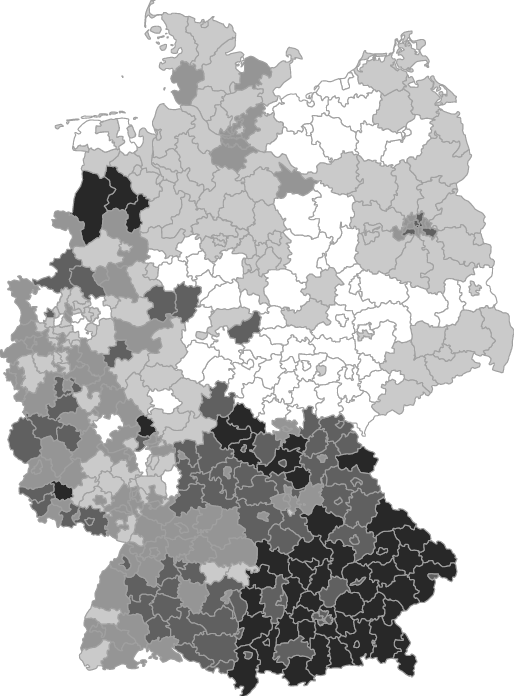This is brilliant: an “in press/corrected proof” version of our article on the effect of distance between candidates and their prospective voters in England has just appeared on the ScienceDirect website (click on the DOI below). If you cannot get beyond the paywall, the authors’ version is still available here.
- Arzheimer, Kai and Jocelyn Evans. “Geolocation and voting: candidate-voter distance effects on party choice in the 2010 General Election in England.” Political Geography 31.5 (2012): 301–310. doi:10.1016/j.polgeo.2012.04.006
[BibTeX] [Abstract] [Download PDF] [HTML] [DATA]
The effect of geographical distance between candidate and voter on vote likelihood in the UK is essentially untested. In systems where constituency representatives vie for local inhabitants’ support in elections, candidates living closer to a voter would be expected to have a greater probability of receiving that individual’s support, other things being equal. In this paper, we present a first test of this concept using constituency data (specifically, notice of poll address data) from the British General Election of 2010 and the British Election Survey, together with geographical data from Ordnance Survey and Royal Mail, to test the hypothesis that candidate distance matters in voters’ choice of candidate. Using a conditional logit model, we find that the distance between voter and candidates from the three main parties (Conservative, Labour and Liberal Democrat) matters in English constituencies, even when controlling for strong predictors of vote-choice, such as party feeling and incumbency advantage.
@Article{arzheimer-evans-2012,
author = {Arzheimer, Kai and Evans, Jocelyn},
title = {Geolocation and voting: candidate-voter distance effects on party choice in the 2010 General Election in England},
number = {5},
volume = {31},
abstract = {The effect of geographical distance between candidate and voter on vote likelihood in the UK is essentially untested. In systems where constituency representatives vie for local inhabitants' support in elections, candidates living closer to a voter would be expected to have a greater probability of receiving that individual's support, other things being equal. In this paper, we present a first test of this concept using constituency data (specifically, notice of poll address data) from the British General Election of 2010 and the British Election Survey, together with geographical data from Ordnance Survey and Royal Mail, to test the hypothesis that candidate distance matters in voters' choice of candidate. Using a conditional logit model, we find that the distance between voter and candidates from the three main parties (Conservative, Labour and Liberal Democrat) matters in English constituencies, even when controlling for strong predictors of vote-choice, such as party feeling and incumbency advantage.},
journal = {Political Geography},
year = 2012,
doi = {10.1016/j.polgeo.2012.04.006},
pages = {301--310},
keywords = {uk, gis},
html = {https://www.kai-arzheimer.com/paper/geolocation-voting-candidate-voter-distance-effects-party-choice-2010-general-election-england},
data = {https://doi.org/10.7910/DVN/PBCH00},
url = {https://www.kai-arzheimer.com/arzheimer-evans-geolocation-vote-england.pdf}
}